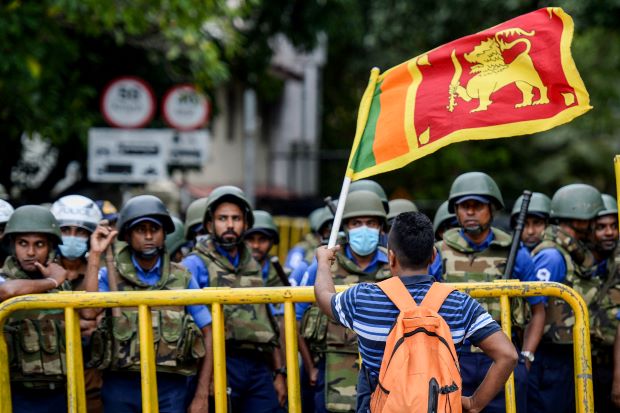Another UN indictment, but will Sri Lanka change?
By M.R. Narayan Swamy
The UN Human Rights Council (UNHRC) has come out with another scathing denunciation of Sri Lanka’s culture of impunity which it says has contributed to its present economic mess. But it remains doubtful if Colombo will ever punish those who killed innocent Tamils in the war against the Liberation Tigers of Tamil Eelam (LTTE).
Unlike in the past, the Sri Lankan government is in the midst of a painful exercise and needs international support, particularly from the West, to put its badly derailed economy back on the rails. So, rejecting any UN report summarily will be diplomatically and politically difficult.
While there is widespread anger against the political class, there is no mass sentiment against the now powerful military in much of Sri Lanka, populated by the majority Sinhalese community. The anger, of course, persists in the North and the East, the former war theatre.
To that extent, Sri Lanka remains ethnically divided, notwithstanding the signs of unity seen among different communities during the recent mass protests against the economic crisis which forced President Gotabaya Rajapaksa to flee the country in July.
Nevertheless, the annual report on Sri Lanka, to be discussed during the 51st session of the Human Rights Council in Geneva starting on September 12, makes hard-hitting criticism of the many deficiencies in governance in the island nation.
An unedited version of the report, accessed by this writer, underlines that impunity is the core problem in Sri Lanka.
It says that even 13 years after the end of the Tamil separatist conflict, impunity remains a central obstacle to the rule of law, reconciliation and sustainable peace and development, with much of Sri Lanka’s north and east still dominated by military presence.
The exhaustive report has praised the anti-government protests, saying they represent “an important starting point for a new and common vision for the future” in a country that continues to undergo convulsions amid the economic mess.
It welcomes some decisions of the government headed by new President Ranil Wickremesinghe, but faults him for continuing to rely on the same clutch of military brass, including those charged with serious human rights abuses in the war against the Tamil Tigers.
Sri Lanka has repeatedly promised to get to the roots of the rights abuses but has not really done so. Previous governments, particularly those headed by the Rajapaksas, have dismissed the charges against the military, which now plays a major role in various levels of administration.
The UN body says that even as victims of rights abuses await truth and justice, Colombo has failed to pursue an effective transitional justice process to hold perpetrators of gross human rights violations accountable.
“Rather, they (governments) have created political obstacles to accountability, actively promoted and incorporated some military officials credibly implicated in alleged war crimes into the highest levels of government,” the report says. “This impunity emboldened those committing human rights violations and created a fertile ground for corruption and the abuse of power.”
The economic crisis underscores the indivisibility of human rights, the UNHRC says.
“For sustainable improvement, however, it is vital to recognize and assist Sri Lanka to address the underlying factors, which have contributed to this crisis, including embedded impunity for past and present human rights abuses, economic crimes and corruption. Support from the international community will have meaningful and sustainable impact if Sri Lanka undertakes deeper structural, constitutional and political reforms to strengthen democratic checks and balances and restore the independence of institutions.”
This process is, no doubt, underway but there are clear signs that there is no unanimity in the Sri Lankan political constituency on the way ahead.
The former regime of Gotabaya Rajapaksa, who has returned to Colombo, has come under criticism for obstructing the process of accountability including by intervening in police investigations and court proceedings in several high-profile human rights cases.
There has been almost no progress in most human rights cases highlighted in previous UN reports. In many instances, hearings have been postponed repeatedly while many cases have merely lingered on. In others, there has been active reversal in the form of acquittals on appeal and presidential pardon granted to those accused or convicted of grave violations.
On the contrary, the families of the disappeared who have been staging roadside protests since 2017 keep facing harassment, intimidation and violence.
While denouncing the ethno-religious majoritarianism promoted by Gotabaya Rajapaksa, the report welcomes President Wickremesinghe’s declaration on August 8 in which he celebrated the country’s ethnic and religious diversity.
The ousted president appointed 28 serving or former military officers in government ministries between 2020 and 2022. After the cabinet ministers quit in April, most officers relinquished their positions. “However, President Wickremesinghe has since continued to rely on military appointees and involve the military in law enforcement.”
The UN wants the new government to embark on a national dialogue to advance human rights and reconciliation and to carry out the deeper institutional and security sector reforms to prevent the recurrence of past violations. It admitted that many challenges lie ahead, including painful economic reforms, and the risk of further violence.
The report noted the continuing significant deficit in confidence and trust between the government, protest movement and broader civil society.
Among the other suggestions the UN report offers is to reverse the drift towards militarization, end reliance on draconian security laws and crackdowns on peaceful protests, and show renewed commitment to security sector reforms and to ending impunity.
It should recommit to a genuine, comprehensive and transformative transitional justice process, with benchmarks and timelines for implementation. It should pursue a more fundamental constitutional reform through broad-based and consultative processes to strengthen democratic checks and balances and devolution of political authority. It also wants military presence cut in the northern and eastern provinces.
-M.R. Narayan Swamy is a veteran journalist and this article was originally featured on thewire.in



Comments are closed, but trackbacks and pingbacks are open.